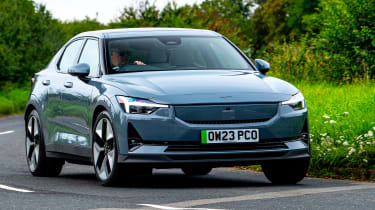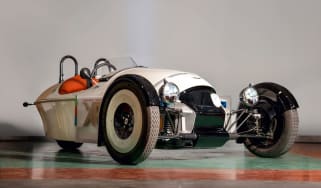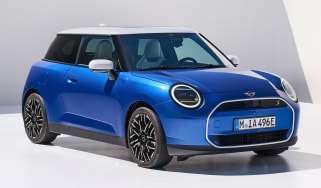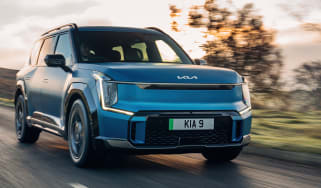Polestar 2: performance, motor & drive
It's fast, grippy and safe, but the Polestar 2 has a firm ride that’s hard to ignore
|
Model |
0-62mph |
Top speed |
Driven wheels |
Power |
|
Standard Range Single |
6.4s |
127mph |
Rear |
268bhp |
|
Long Range Single |
6.2s |
127mph |
Rear |
295bhp |
|
Long Range Twin |
4.5s |
127mph |
Four |
416bhp |
|
Long Range Twin w/ Performance Pack |
4.2s |
127mph |
Four |
469bhp |
Neither the single nor the dual-motor version of the Polestar 2 can match the equivalent Tesla Model 3 for sheer straight-line acceleration, but it still feels like a quick car – even in Single Motor guise. Overall, the driving experience is rewarding, though we’ve got our reservations over ride comfort; we found the Polestar 2 felt firm over typical British back roads – we’d advise you try before you buy.
Polestar 2 0-62mph, top speed and acceleration
In 2023 the Polestar 2 received some pretty serious upgrades, switching from front to rear-wheel-drive and getting a revised line-up of more powerful electric motors in the process. The result of this is not only punchier acceleration, but a slightly more involved driving experience.
Admittedly, no version of the Polestar 2 offers neck-snapping acceleration – even top models specified with the optional Performance Pack – but even entry-level Single Motor cars have enough poke for fuss-free motorway overtakes. Dual Motor cars should offer more grip in slippery conditions despite their rear bias and feel incredibly brisk when getting up to speed from a standstill. That being said, the Single Motor car gets our vote, primarily for the extra range it offers.
Handling
The Polestar 2 was already one of the sportier options in this segment, and the switch from front to rear-wheel drive has only benefited the driving experience. There is very little body roll, and grip is excellent. The steering is well weighted and the newly repositioned electric motor now provides the sensation of pushing you out of a corner, adding to the sense of fun.
However, we’ve long had reservations about ride quality, and unfortunately the model year revisions do nothing to improve the car in this respect. Broken back roads cause the car to bounce and fidget; we found it really rather uncomfortable at times.
Things don’t really improve around town either, where the firm Polestar feels too stiffly sprung at low speeds. The electric hatchback is at its best on the motorway, in fact, where things begin to smooth out; at 70mph there’s a good flow to the way this car drives.
The Polestar 2 offers three levels of regenerative braking, the strongest of which offers full one-pedal driving.




